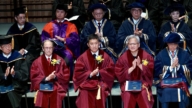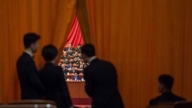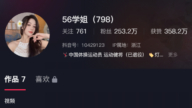【新唐人2012年2月6日訊】在第48屆「慕尼黑安全政策會議」上,美國國會重量級參議員馬侃警告說:「『阿拉伯之春』也將來臨中國。」這番話觸動了中共的敏感神經,參與會議的中共副外長張志軍竭力辯駁。外界評論指出,中共的維穩開支已超過了國防預算,結束中共專制的變革不久將來臨。
參與2月4號會議討論的包括馬侃、張志軍、澳大利亞外長陸克文、法國前外長巴尼耶等政要,討論由美國前國務卿基辛格主持。
美國前共和黨總統候選人馬侃表示,美國雖然戰略重心轉向亞太,但不會放棄在中東地區的關鍵作用。他呼籲安理會制止敘利亞總統阿塞德屠殺平民。
4號,聯合國安理會譴責敘利亞屠殺的決議,再次遭到中俄否決。在此前一天,敘利亞政府軍炮擊抗議民眾,造成至少260位平民死亡,成為敘利亞近一年來最血腥的一天。
在4號的慕尼黑會議上,與會各方表達了對中共非民主化體制,和軍力擴張對世界安全的憂慮,馬侃提到了最近藏族僧侶自焚抗議中共統治的事件。
馬侃:「我在很多場合都說過,並再次重申,『阿拉伯之春』也將來臨中國,而且你(中共)無法完全遏制它,因為有這些設備的傳播(顯示手機)。」
馬侃還提到了南中國海主權爭端。中共副外長張志軍反駁說,維持地區和平與穩定關係到中國的切身利益,他指責美國強化亞太軍事存在,製造緊張氛圍,有悖潮流。
《人民網》報導,會場氣氛一度充滿火藥味。
美國哥倫比亞大學訪問學者王天成表示,中共自己欺騙自己,說受到民眾的擁護,無視各種社會危機。
王天成:「它這個經濟增長是以犧牲人權、犧牲公平正義為代價的,積纍了很多的矛盾,實際上中國變得越來越不穩定了,政府也變得越來越腐敗。在這種情況下,如果中國政府不選擇政治改革的話,『阿拉伯之春』終將會來臨的。」
王天成表示,蘇聯、東歐劇變發生前,沒有人相信強大的蘇聯會土崩瓦解。中共強調與今日的中東北非、昔日的蘇聯不一樣,但卻躲不過反專制的歷史潮流。
王天成:「中國的政府可能會像所有的獨裁者一樣,相信自己的鎮壓能力,但是,鎮壓並不是任何時候都有效的,要不然的話,所有的獨裁國家都會長命百歲了。當然,這一天來臨的時候,可能很多人都會感到震驚。」
「阿拉伯之春」已經帶給中國巨大的影響。近期,一份中共安徽省發出的維穩文件曝光,當局要求24小時監控互聯網、手機短信、微博等通訊,預防重大群體性事件的發生。
北京註冊會計師杜延林表示,當局高壓維穩終將會使社會危機和矛盾激化。
杜延林:「以後政治變動的方式我很難預測,不一定是『阿拉伯之春』這種方式,但是,變革是必然的,這就看執政者是不是理性的對待民眾的訴求,如果他能足夠理性,能夠作出主動的政治讓步的話,也許是一種更為溫和的政治變革形式;如果是採取了卡扎菲那種方式,或另外一種更極端的方式,也許是另外一種方式。」
「全球退黨服務中心」主席易蓉指出,《九評共產黨》引發的退黨大潮,正在從組織上解體中共,引導全民走向精神覺醒,為中國不久將來的政治變革提供了和平轉型的途徑。
新唐人記者秦雪、李元翰、周平採訪報導。
———————
McCain: The Arab Spring Is Coming To China As Well.
On the 48th Munich Conference on Security Policy,
the U.S. Congress Senator John McCain sent out a warning.
“The Arab Spring is coming to China as well.” He said.
McCain’s talk touched the sensitive nerve of the
Chinese Communist Party (CCP)’s regime.
Zhang Zhijun, CCP’s Vice Foreign Minister,
struggled to refute the remark in response.
Outside comments review the fact that the CCP’s expenditure
on stability maintenance has exceeded it’s defense budget.
A change that indicates that the CCP dictatorship’s end
will come soon.
On February 4, the Security Conference attendees included
McCain, Zhang Zhijun, Australian Foreign Minister, Kevin Rudd,
former French Foreign Minister Michel Barnier, among others.
Henry Kissinger, former U.S. Secretary of State chaired the discussion
Former U.S. Republican presidential candidate John McCain
said the U.S. won’t give up it’s key role in the Middle East.
McCain called on the UN Security Council to stop
the Syrian President Bashar al-Assad’s massacres of civilians.
China and Russia have both vetoed the UN Security Council’s
resolution condemning the Syrian massacre on 4th February.
One day before, the Syrian army had shelled protesters,
killing at least 260 civilians. The day became the bloodiest day in Syria so far this year.
Participants of the Munich Conference on 4th Feb.
expressed much concern about the CCP regime.
The CCP’s non-democratization system and its military
expansion are causing a threat to the world.
McCain mentioned the recent self-immolations of
Tibetan monks who have protested against the CCP’s rule.
McCain said: “I have said on many occasions and I will
say it again. The Arab Spring is coming to China as well.
And there is no way that you will be able to stifle it completely
because of these devices (shows a mobile phone).”
McCain also referred to the South China Sea sovereignty dispute.
CCP vice Foreign Minister, Zhang Zhijun, refuted his comments.
Zhang alleged that, the maintenance of regional peace and
stability relates directly to China’s vital interests.
Zhang accused the US of strengthening its Asia-Pacific
military presence and of creating a tense atmosphere.
The CCP’s mouthpiece People’s Daily reported that the
meeting’s atmosphere was filled with the smell of gunpowder.
Wang Tiancheng, a visiting scholar at Columbia University,
says that the CCP regime cheats itself.
The regime touts that it is supported by the Chinese people.
Whereas In reality, it is indifferent to a variety of social crises.
Wang Tiancheng says: “China’s economic growth is costing
human rights and justice.
The accumulated massive contradictions have led to an increasing
instability, in reality. The authorities’ corruption is expanding.
In this case, if China’s authorities don’t make political reform,
the “Arab spring" will eventually arrive."
Wang says that before the fall of communism in the Soviet Union
and in Eastern Europe, no one believed the SU could fall apart.
The CCP stressed today’s Middle East is different from
the former SU, yet it cannot escape the anti-authoritarian trend that is manifesting in the Middle East.
Wang Tiancheng says: “Like any dictator, China’s government
may feel confident with its repressive power.
However, a crackdown is not effective at any time.
Otherwise, all authoritarian countries would live long lives.
Of course, when the day comes,
many people may well be shocked."
The Arab Spring has had a huge impact on China. Recently,
an official document of the CCP’s Anhui authorities was exposed.
The authorities had issued the file for the maintenance of stability.
24-hour surveillance over the internet, SMS, micro-blog,
and other communication tools are required.
The aim is to prevent mass protests and outbreaks, the file said.
Du Yanlin, Beijing-based CPA, comments that the regime’s
high-handed stability will intensify the social conflicts and crises.
Duyan Lin: “I feel it is hard to predict how politics will vary in
the future. It may not necessarily go the way of the Arab Spring.
But change is inevitable; we shall see how the regime deals
with the people』s appeals, rationally or otherwise.
If it’s rationally, making active political concessions,
it’s perhaps a mild form of political change.
If it chooses Gaddafi’s road or any other extreme ways,
that may bring China yet another change in politics."
Chairman of the Global Quitting the CCP Service Center,
Yi Rong, points out that the tidal wave of quitting the CCP
triggered by the book Nine Commentaries on the
Communist Party is disintegrating the CCP’s organization.
The movement is guiding people worldwide to head for
a spiritual awakening.
Yi Rong notes that this provides a peaceful way to make
a political transformation in China in the near future.
NTD reporters Qin Xue, Li Yuanhan and Zhou Ping




























